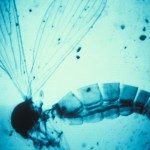Link to Pubmed [PMID] – 34442731
Link to HAL – pasteur-03340454
Link to DOI – 10.3390/microorganisms9081652
Microorganisms, 2021, 9 (8), pp.1652. ⟨10.3390/microorganisms9081652⟩
Palm Creek virus (PCV) is an insect-specific flavivirus that can interfere with the replication of mosquito-borne flaviviruses in Culex mosquitoes, thereby potentially reducing disease transmission. We examined whether PCV could interfere with arbovirus replication in Aedes (Ae.) aegypti and Ae. albopictus mosquitoes, major vectors for many prominent mosquito-borne viral diseases. We infected laboratory colonies of Ae. aegypti and Ae. albopictus with PCV to evaluate infection dynamics. PCV infection was found to persist to at least 21 days post-infection and could be detected in the midguts and ovaries. We then assayed for PCV-arbovirus interference by orally challenging PCV-infected mosquitoes with Zika and chikungunya viruses. For both arboviruses, PCV infection had no effect on infection and transmission rates, indicating limited potential as a method of intervention for Aedes-transmitted arboviruses. We also explored the hypothesis that PCV-arbovirus interference is mediated by the small interfering RNA pathway in silico. Our findings indicate that RNA interference is unlikely to underlie the mechanism of arbovirus inhibition and emphasise the need for empirical examination of individual pairs of insect-specific viruses and arboviruses to fully understand their impact on arbovirus transmission.


